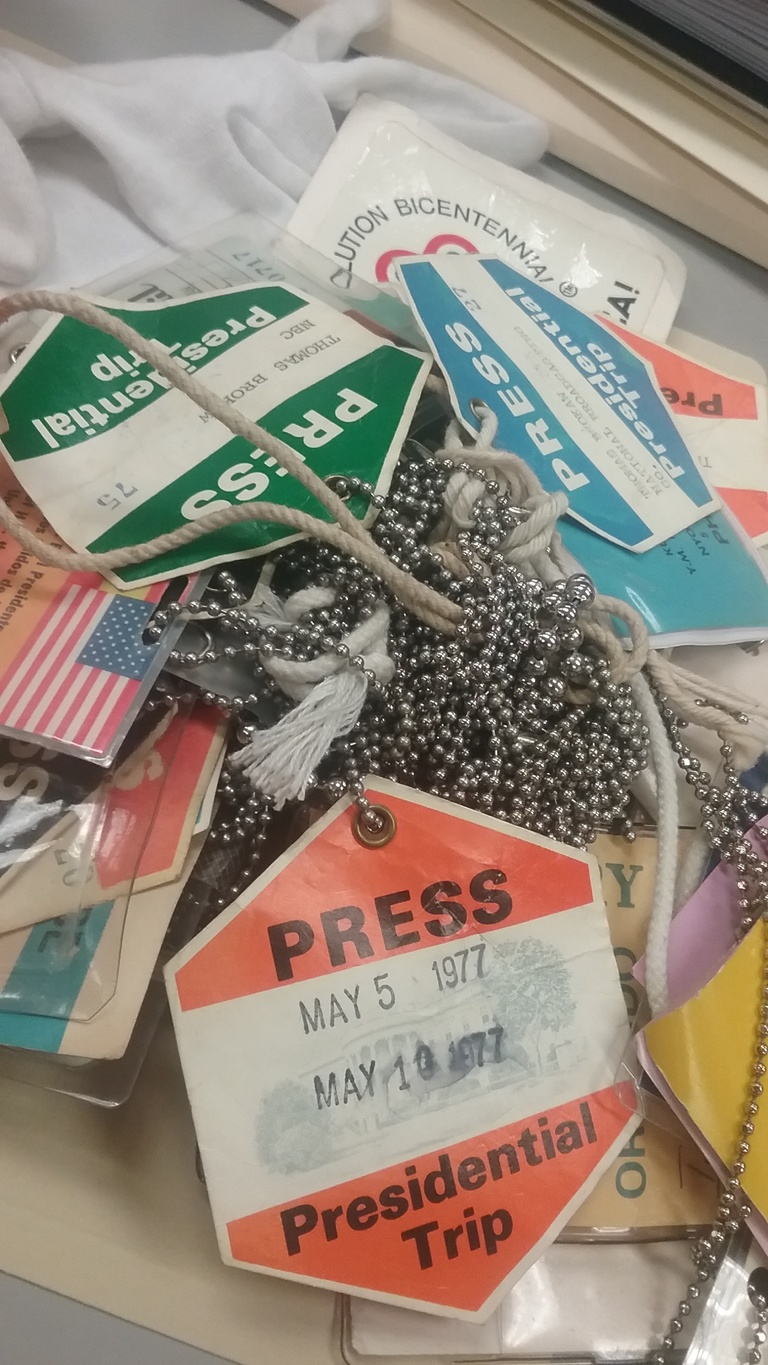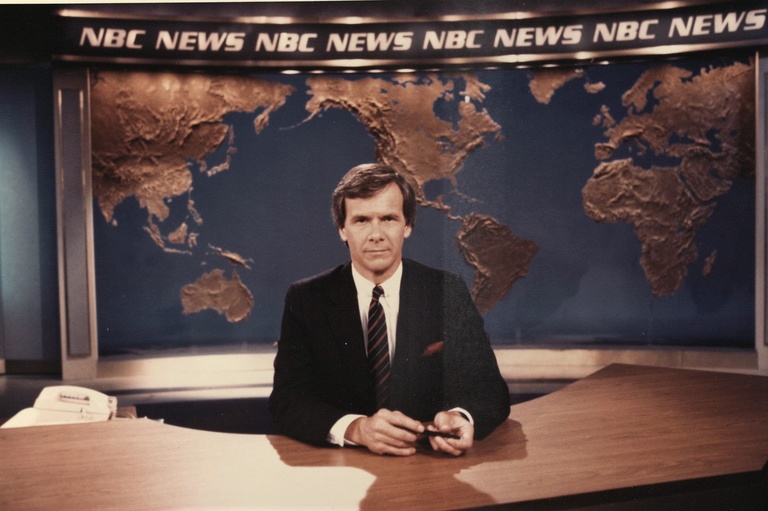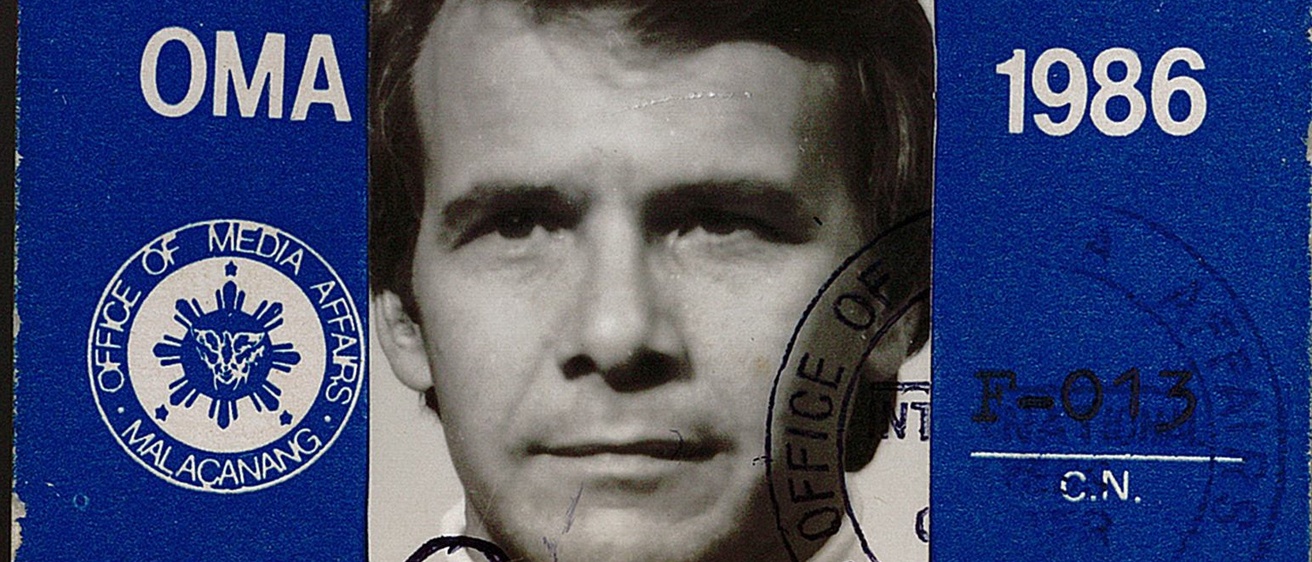In 2016, journalist Tom Brokaw donated his papers to the University of Iowa Libraries Special Collections and Archives. The collection includes notes and drafts for several of Brokaw's books (including from his best-known work, The Greatest Generation), letters from heads of states and other media figures, photographs, awards, and appointment calendars.

Amongst the many boxes of papers was a worn blue Pan-Am bag that had a handwritten note on its side: “Trove of press passes.”
Everyday object, extraordinary events
The passes are tactile and intimate, having been worn by Brokaw. The typefaces, logos, and color palettes give a sense of the eras from which they came, stretching from the 1960s to recent years. And the names of the events themselves vacillate between the seemingly mundane—the Portland Forest Conference—to the truly historic—think royal weddings and Middle Eastern treaty signings.
Press Pass Access with Tom Brokaw: History Through the Eyes of a Journalist is a new website that uses these objects to provide a unique view on history—the perspective of the journalist, who is often history's first author. Intended for use by college and high school teachers of American history and of journalism, the site places 150 of Brokaw’s passes on a timeline that begins with his years as a young journalist in Nebraska and South Dakota in the 1960s to the events that became central to his career, including the fall of the Berlin Wall. Entries appear on a map to contextualize locations and include an overview of what was notable about the event, as well as links to related video clips.
Over the course of just eight weeks, the site was organized, researched, and written by Patrick Johnson, a Summer 2021 Humanities for the Public Good intern. Johnson, who is a Ph.D. candidate in Journalism and Mass Communication, had been a high school journalism teacher for eight years at Antioch Community High School in Illinois. It was a job he loved. And the feeling seems to have been mutual: he was voted “most inspirational teacher” by his students five times. During the pandemic, he decided to leave what he thought he loved the most to pursue another graduate degree.
Working with a hero's papers
“Antioch quite literally was my home,” Johnson said. “My family grew up there; they attended the school I taught at. The Tom Tom, the publication I advised, was the first newspaper I remember holding, since my grandpa used to bring it home to me to read." He eventually decided to move into higher education, to dig more deeply into the history and ethics of the field about which he is so passionate.
When the opportunity to work with one of his journalistic hero’s papers became available through the Humanities for the Public Good Internship Program, Johnson applied nearly immediately. His teaching background and scholarly interest in journalism history dovetailed perfectly with the project. Elizabeth Riordan, lead outreach and instruction librarian for UI Special Collections, who envisioned the project along with John Culshaw, Jack B. King University Librarian, said that Johnson immediately understood what was possible.
“It’s so refreshing to share your vision with someone and have them just run with it!” said Riordan, who served as Johnson's mentor for the summer. “Patrick was already so passionate about Brokaw and the history of journalism. He wanted to create something that would really help students learn.”
A ticket to heaven

One thing Johnson gets from the inside out is how much journalists value press passes. They may be mere pieces of plastic, but they have caché and lore to them—like a hard-to-get concert ticket. “We joke that a press pass can get you into heaven,” Johnson shared.
Riordan realized early on that press passes operate as a sort of informal CV. She recalls how, when Brokaw visited the archives with a crew from NBC News to film a story about the collection, all of them stood around during a break looking through the press passes with excitement. “They were sharing stories about their own collections,” she remembered, which is when the idea of telling the story of Brokaw’s career via the passes clicked.
With the goal of turning them into a searchable database, Johnson began his internship in June 2021 by figuring out the passes’ chronological order—a task that was harder than it seemed because Brokaw had taken many "trips within trips." For example, traveling to Japan to cover the funeral of a dignitary could also include a day trip to the Philippines to cover a conflict. Next, Johnson had to locate the reason for each trip. Had Brokaw been part of the presidential press corps? Or was he covering for NBC, like the Olympics? For example, why was Brokaw in Portland for that tree conference? (Answer: He was covering a talk by President Bill Clinton about forest policy, and it was a side junket to the more remembered trip, a diplomatic meeting in Vancouver, Canada, between Clinton and Russian President Boris Yeltsin.)
Connecting archival objects to today's students
The largest portion of Johnson's time went toward researching and writing entries for the database. Hours were spent looking at presidential daily diaries available via presidential libraries. (As just one example, see this daily diary from the Nixon Presidential Library.) He also oversaw Ben Wootton, an undergraduate research assistant who located video related to each event, and met with Jay Bowen, a developer from the Digital Scholarship and Publishing Studio, about usability issues. About midway through the process, with the end goal of creating a teaching tool in mind, he reached out to the Journalism Education Association looking for teachers to test-drive the site.

“We got very positive feedback,” Johnson said of the teachers’ responses. "They felt that Brokaw is someone they want their kids to know, and that this can help to teach history in a unique way.” They also really wanted to hear from Brokaw—something the elder journalist had been hesitant to do, so Johnson asked Brokaw some questions, and Brokaw created a video to be included in the project. That recording, which can be accessed on the homepage of the site, was among several interviews Johnson did with Brokaw. Johnson’s deep attachment to the history of the project, and his belief in Brokaw as a true role model, meant that getting to speak directly with him was a masterclass in his profession.
“Tom is such a kind soul, with such a tremendous amount of history in his head,” Johnson said. “I learned about scaffolding at the Royal Wedding, his connection with Nancy Reagan and Gorbachev, and the beginnings of his journey at the University of Iowa. Not many have the chance to know an icon, let alone speak to them and have their phone number!”
Change it, but don't forget what you love
It was Brokaw’s personal advice that most resonated with Johnson.
“I know it sounds cliché or selfish, but I had one of my journalism idols on the phone with me. I was talking directly to him about his career and why journalism mattered,” Johnson said. “So I deviated from my questions to get advice about life and how to follow my heart. He told me that to make a career of what you love, you must first love what you are making a career of. He shared that if I were truly to make a difference, I needed to think about what needs to change in the system but remember what always worked. To him, history cannot be forgotten. I never intend to forget it.”
The site went live in November 2021, and now Riordan is eager to promote it to teachers. “Reaching history teachers at the national level is a major goal,” she says. "It's important to Brokaw that the collection is used for teaching purposes."
While Johnson has been less involved with the collection since his internship ended—he took his comprehensive exams in August and is currently teaching—he stays in touch with Riordan about the project's future. Riordan has encouraged Johnson to use the collection for his dissertation research. But Johnson, who doesn’t like to play things safe, has another major journalist in mind as a possible research focus: Hugh Hefner.
